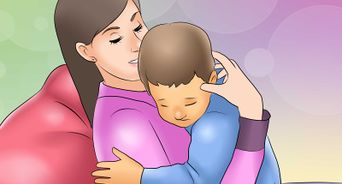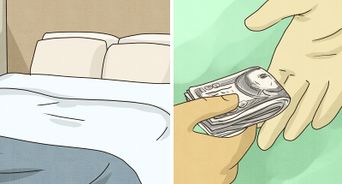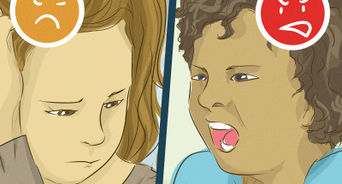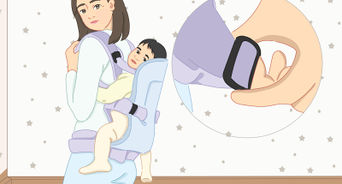
[ad_1]
Steps
Part 1
Part 1 of 3:
Assessing the Situation
-

1Stay calm and relaxed when the topic comes up. It’s normal and natural for kids of all ages to ask about babies. It helps to be prepared for the conversation, but even if you aren’t, try to stay calm and don’t jump to conclusions. Take a deep breath and talk to them like you would about any other topic.[1]
- Your first reaction might be to laugh or redirect the conversation. However, if you dismiss them, they’ll only become more curious about the topic. It’s best to address the question when they ask.
-
 2Defer to the child’s parents/guardian if someone else’s child asks you about babies. If you’re a babysitter or nanny, the children who you watch might ask you about babies or sex at some point. Stay calm and use your best judgement to approach the situation. If it’s a body question, answer it scientifically. If it’s a question that you think you can’t or shouldn’t answer, let them know that they can ask their guardians.[2]
2Defer to the child’s parents/guardian if someone else’s child asks you about babies. If you’re a babysitter or nanny, the children who you watch might ask you about babies or sex at some point. Stay calm and use your best judgement to approach the situation. If it’s a body question, answer it scientifically. If it’s a question that you think you can’t or shouldn’t answer, let them know that they can ask their guardians.[2]
- For example, you could say something like, “Let’s ask your mom when she gets home, maybe she’ll know!” Chances are, they’ll forget about it, and you can let their parents know that the child was curious about babies or sex.
- If they continue to push your limits and ask more personal questions, stay calm and treat it like you would if they were misbehaving in any other way. Remind them that they shouldn’t use dirty words if they’re swearing, and tell them that if they continue to do so, you’ll have to call their parents.
-
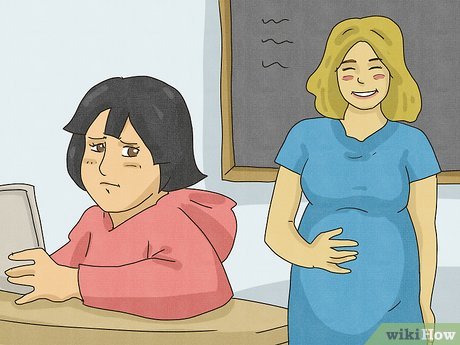 3Consider why your child might be curious about babies. While kids are naturally inquisitive, there might be a reason that they’re asking this particular question. For example, their teacher at school might be pregnant, or they might have seen a baby on television or in public.[3]
3Consider why your child might be curious about babies. While kids are naturally inquisitive, there might be a reason that they’re asking this particular question. For example, their teacher at school might be pregnant, or they might have seen a baby on television or in public.[3]
- If you’re pregnant, an older child might become curious about their new sibling. It’s very common for children to start asking about babies and pregnancy when they know there’s a baby on the way.
-
 4Ask them where they think babies might come from. Your child might be asking you about babies to confirm what they already know. If you’ve never talked about it before, try saying something like “That’s a good question! Where do you think babies come from?” to see what they know about the topic.[4]
4Ask them where they think babies might come from. Your child might be asking you about babies to confirm what they already know. If you’ve never talked about it before, try saying something like “That’s a good question! Where do you think babies come from?” to see what they know about the topic.[4]
- If you’ve discussed babies and pregnancy before, start by confirming what you’ve already discussed. Say something like “Well, we’ve talked about how babies are made sperm meets an egg, right?” When they confirm that they know that information, move on to answering their new question.
- If they say that they don’t know, assure them that it’s okay. Then, proceed with answering their question as best as you can.
Part 2
Part 2 of 3:
Responding to the Question
-
 1Answer the question that your child is asking. Many parents get flustered because they feel like they have to explain the entire process to their children. Instead, focus on providing a truthful answer to the question that they asked you.[5]
1Answer the question that your child is asking. Many parents get flustered because they feel like they have to explain the entire process to their children. Instead, focus on providing a truthful answer to the question that they asked you.[5]
If they asked specifically how babies get out of their mom, you can say something like “Babies are born when a person with a uterus pushes the baby through the birth canal, which is part of their vagina.”[6]
- Once you answer their initial question, they might ask more or they might be content. If they don’t seem satisfied with your answer, ask them something like “Is there anything else that you want to know about babies?” or “Do you have any more questions?”
-
 2Tailor your approach to be age-appropriate. A younger child doesn’t need to know all of the specific details about pregnancy and making a baby. For kids under 6 years old, keep the discussion general and simple. As they get older, you can build off of your previous conversations to answer more specific questions.[7]
2Tailor your approach to be age-appropriate. A younger child doesn’t need to know all of the specific details about pregnancy and making a baby. For kids under 6 years old, keep the discussion general and simple. As they get older, you can build off of your previous conversations to answer more specific questions.[7]
- Additionally, there’s a chance that a younger child might forget some of the information that you tell them as they grow up. It’s likely that you’ll have to have a few different conversations about where babies come from before they really absorb and understand the information.
-
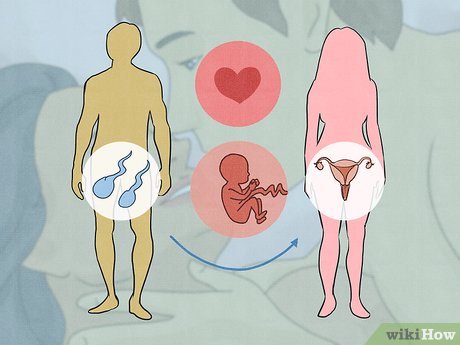 3Avoid using slang or euphemisms when talking about sex or sex organs. Treat genitals like any other part of the body when you’re talking to your child. Use the words penis, vagina, uterus, sex, seed, and egg to refer to the process of making a baby. This will ensure that they don’t get confused as they grow up and learn more about topics like sex.[8]
3Avoid using slang or euphemisms when talking about sex or sex organs. Treat genitals like any other part of the body when you’re talking to your child. Use the words penis, vagina, uterus, sex, seed, and egg to refer to the process of making a baby. This will ensure that they don’t get confused as they grow up and learn more about topics like sex.[8]
- For example, you can say “Sperm has to meet an egg to make a baby,” to teach them about general reproductive anatomy.
- You can start teaching your child about their genitals when they’re learning the rest of their body parts. By the time they’re around 2 or 3 years old, they should know that, a female has a vagina, a male has a penis, and some people are intersex.
- It’s okay to refer to sex as “making love” when you’re answering questions about making babies as long as they know that this phrase means having sex. This can help the child to associate babies with something positive, rather than something scary or negative.
-
 4Give simple but honest answers to children under 5 years old. Younger children tend to be more focused on pregnancy and how babies come into the world, rather than the act of sex. Explain that sperm has to meet an egg, and that the baby forms in the uterus of the female.[9]
4Give simple but honest answers to children under 5 years old. Younger children tend to be more focused on pregnancy and how babies come into the world, rather than the act of sex. Explain that sperm has to meet an egg, and that the baby forms in the uterus of the female.[9]
- For instance, if they ask how babies are made, you might say something like “Sometimes, babies are made when two people have sex, and the one person’s sperm fertilizes the other person’s egg. Then, the baby grows in the uterus for 9 months until it’s big enough to be born.”
- If they’re asking about how the baby comes out, explain that the baby comes out of the vagina, which stretches as the baby is born. You might also want to tell them that some parents choose or medically have to have a surgery to take the baby out of their uterus instead.
- Be sure to explain that the uterus is part of the vagina, and different from the stomach. Since babies look like they’re inside of the parent’s stomach, this can be a very confusing idea for children.
-
 5Use picture books to help you explain the topic to a younger child. There are many books on the market that explain the process of making and having a baby in simple terms. They often include illustrations that are child appropriate and as non-sexual as possible.[10]
5Use picture books to help you explain the topic to a younger child. There are many books on the market that explain the process of making and having a baby in simple terms. They often include illustrations that are child appropriate and as non-sexual as possible.[10]
[11]
- If you can’t find a children’s book that does a good job of explaining the process, try picking up an anatomy book. It may be more detailed than necessary, but you can use it to show where the baby grows, and what genitals look like.
- Anatomy books are also great for learning the answer to tougher questions, like “Where does the egg come from?” or “How is sperm made?”
-
 6Start talking about puberty when your child is between 6 and 12 years old. For females, puberty can start as early as 8 or 9 years old, and for males, it can start around 9 or 10. Talk to them about the fact that puberty will cause changes in their body shape, mood, and day-to-day life. Let them know that the period is a sign that a person with a vagina is able to have a baby, and talk about how ejaculate from the penis can fertilize an egg if they have sex.[12]
6Start talking about puberty when your child is between 6 and 12 years old. For females, puberty can start as early as 8 or 9 years old, and for males, it can start around 9 or 10. Talk to them about the fact that puberty will cause changes in their body shape, mood, and day-to-day life. Let them know that the period is a sign that a person with a vagina is able to have a baby, and talk about how ejaculate from the penis can fertilize an egg if they have sex.[12]
- For example, if your child asks about when they’ll get their first period, you can say something like, “Most people with vaginas get their first period when they’re between 9 and 16 years old. Some people get it earlier, and some get it later. Your first period is a sign that your body is starting to become sexually mature, and it means that you could get pregnant if you have sex with somebody with a penis.”
- Try to talk about puberty as something that is normal and natural, because it is! Build off of the conversations that you’ve had with them when they were younger, and let them know that puberty might cause them to think about sex more often.
-
 7Let older children know that you’re still there to answer their questions. While an older kid might think they know all there is to know about sex, that’s not always true. If you’ve established yourself as someone who they can talk to about sensitive topics, be prepared for more specific questions. For example, a teenager might ask something like “Can I get pregnant from having oral sex?”[13]
7Let older children know that you’re still there to answer their questions. While an older kid might think they know all there is to know about sex, that’s not always true. If you’ve established yourself as someone who they can talk to about sensitive topics, be prepared for more specific questions. For example, a teenager might ask something like “Can I get pregnant from having oral sex?”[13]
- You can remind your teenager that you can still help to answer their questions by saying something like, “I know growing up can be confusing, but if you have any questions about relationships or your body, you can always talk to me.”
- Use their questions to remind them about the risks of having sex without giving them a lecture. For the oral sex example, you can say “You can’t get pregnant from having oral sex, but you can get an STD.”
- Don’t assume that your child is asking about sex because they’re having sex. It’s very possible that they’re just asking because they were talking with their friends about the topic or saw it in a movie.
-
 8Encourage diversity when discussing where babies come from. It is widely acknowledged that babies are born when “a man and a woman have sex.” However, this is not always the case. There are several methods for having a baby. For example, a lesbian or transgender couple may use in vitro fertilization to start a family, a gay couple may ask for a family member or friend to be a surrogate, and some nonbinary/transgender people with vaginas may carry a baby. It’s important to teach and understand that not all babies are born to cisgender women and men when they have sex.[14]
8Encourage diversity when discussing where babies come from. It is widely acknowledged that babies are born when “a man and a woman have sex.” However, this is not always the case. There are several methods for having a baby. For example, a lesbian or transgender couple may use in vitro fertilization to start a family, a gay couple may ask for a family member or friend to be a surrogate, and some nonbinary/transgender people with vaginas may carry a baby. It’s important to teach and understand that not all babies are born to cisgender women and men when they have sex.[14]
[15]
- Use gender neutral language when discussing sex and pregnancy, such as ‘a person with a vagina/uterus’, ‘a person with a penis/testicles’, ‘pregnant people’ (as opposed to pregnant women), and ‘birth givers’.
- You can explain IVF by saying something like, “When someone with a uterus (usually a woman, but occasionally a trans man or a nonbinary person) wants to have a baby but can’t or doesn’t want to have one by having sex, they can go to the doctor and get sperm put in their uterus artificially”.
- You can explain surrogacy by saying something like, “Surrogacy is when someone grows a baby in their uterus for somebody else to have.”
Part 3
Part 3 of 3:
Continuing the Conversation
-
 1Include information about reproduction in everyday examples. It’s important to let children know that questions about babies and sex are normal. Try to look for ways that you can teach your child about the process of having a baby before they even ask.[16]
1Include information about reproduction in everyday examples. It’s important to let children know that questions about babies and sex are normal. Try to look for ways that you can teach your child about the process of having a baby before they even ask.[16]
- For example, if you’re at the zoo and see a pregnant animal, you might say something like, “Do you see that tiger that is bigger than the rest of them? They’re pregnant and going to have baby tigers!”
-
 2Have a discussion about positive and healthy relationships. For children older than 6, this is also a good opportunity to start talking about relationships. Explain that some people are straight, while others might be gay, queer, or nonbinary/transgender. Discuss what happens when someone is in a relationship, and what it means to be respectful while in a relationship.[17]
2Have a discussion about positive and healthy relationships. For children older than 6, this is also a good opportunity to start talking about relationships. Explain that some people are straight, while others might be gay, queer, or nonbinary/transgender. Discuss what happens when someone is in a relationship, and what it means to be respectful while in a relationship.[17]
- At this point, they might be “grossed out” by discussions about relationships and sex. It’s still important to talk about it, and let them know that they once they’re sexually mature, they can make a baby if they have sex.
- Remember to include information about contraception, STDs, and peer pressure in your conversation whenever it’s appropriate.
- Educate your teen about consent and communication in a relationship.
-
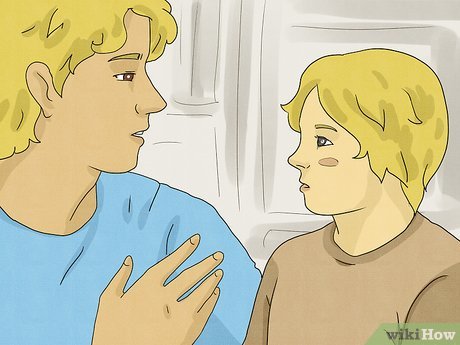 3Let your child know that they have a right to their privacy and personal space. Assure them that their genitals are private parts and that sex is a personal experience. Clarify with small children that only their parents or doctor should see these parts when helping them get clean or doing a check-up. Remind them that no one should ever ask to touch their private parts or ask them to touch someone else’s.[18]
3Let your child know that they have a right to their privacy and personal space. Assure them that their genitals are private parts and that sex is a personal experience. Clarify with small children that only their parents or doctor should see these parts when helping them get clean or doing a check-up. Remind them that no one should ever ask to touch their private parts or ask them to touch someone else’s.[18]
- You can explain this to a younger child by saying something like, “The vagina and penis are private parts, and no one should ever ask to touch yours or ask you to touch theirs. If someone does ask you that, you can tell me and I won’t be mad.”
- Teach your child to get out of uncomfortable or scary situations by saying “No,” or “I have to leave.” Let them know that it’s never wrong to say no to an adult if they’re scared or uncomfortable.
- Reassure your child that they will never be in trouble for telling you about a “secret” that has to do with their body or private parts.
Video
Tips
-
Anatomically-correct baby dolls are a good way to introduce young children to their bodies. They can help your kids ask questions and understand how things work.⧼thumbs_response⧽
Warnings
-
Remember that reproduction is a natural part of life. If you’re uncomfortable when children come to you for guidance, they may seek that guidance from less credible sources.⧼thumbs_response⧽
[ad_2]
Source link : https://www.wikihow.com/Answer-Where-Do-Babies-Come-From





